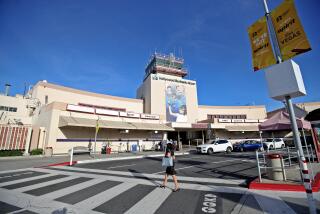Airlines Found Liable in Death of Asthmatic
- Share via
Two commercial airlines were held liable in the wrongful death of an elderly woman because they refused to let her take her medication on board--and then misplaced it, a federal judge in Los Angeles ruled Thursday.
Caroline Neischer, 75, of Inglewood wanted to board the plane with a carry-on bag that contained a special inhaler and medication she needed for her asthma. But an airline ticket agent forced her to check the regulation-sized bag, which was not returned to her until two days after she landed, court testimony showed.
Both carriers Neischer used to travel from Los Angeles to Guyana--American Airlines and British West Indies Airlines--were held liable, even though it was unclear whose personnel had made the decision to keep Neischer from taking her bag on with her.
One national expert in the field of aviation litigation said the ruling by U.S. District Judge Christina A. Snyder represented the first time an airline had been held financially responsible for someone’s death because of mishandled luggage.
“It should put all airlines on notice that medical equipment that is used in the active care of a passenger must be made sure to be at the right place at the right time,” said Ned Good, a specialist in aviation litigation and past president of the Consumer Attorneys of California. “This is not like taking your bathing suit to Hawaii and they send it to Alaska and you have to buy a new suit.”
Neischer, an energetic matriarch with 40 grandchildren, died Dec. 23, 1997, nine days after boarding a connecting flight from New York to Guyana.
She was on her way to her homeland for a grandson’s wedding. It was a trip she had made several times before, always carrying the same bag full of medication, court testimony showed.
On this trip, she and her daughter, Florence Prescod of Los Angeles, arrived at Los Angeles International Airport an hour early, so they could make sure American Airlines allowed Neischer to keep the bag with her on the plane.
Prescod, who described herself as fastidious, also made the ticket agent call ahead to New York to obtain a promise to allow her mother to carry the bag on board on the second leg of the trip.
But when Neischer got to New York, an unidentified ticket agent refused to allow her on board with the bag and forced her to check it, according to the woman’s survivors, who said she was in tears when she landed in Guyana.
Neither the lawsuit nor court testimony gave any rationale for why an airline employee would have prevented Neischer from carrying her medication onto the flight with her. Lawyers for both airlines had no immediate comment Thursday.
“Someone insisted she relinquish her bag, which she did, kicking and screaming,” said Prescod’s lawyer, Bruce Altschuler. “They promised her it would be there when she got to Guyana. When she arrived, all of her bags were missing, including the carry-on.” The bags--and the medication--finally arrived two days later, by which time Neischer was already suffering from acute anxiety and breathing problems. She entered a Guyana hospital, where she died a week later.
At issue in the trial was whether the actions of airline employees constituted “willful misconduct,” given Prescod’s efforts to ensure that her mother’s breathing device and medication remained with her at all times.
All claims stemming from international air travel are governed by the Warsaw Convention of 1929, which imposes a $75,000-per-passenger limit on liability. Families can seek more if the airline is engaged in willful misconduct, such as breached security or poor maintenance. But until Thursday’s verdict, no one had sued successfully and won an award for an airline’s willful negligence involving a death caused by the loss of luggage, expert Good said.
In her ruling after the nonjury trial, Judge Snyder concluded that the two airlines were liable for Neischer’s death because they had been put on notice that she needed her medication to breathe and then ignored her requests before misplacing the bag.
Had Neischer been allowed to take her bag on board, Snyder ruled, “it is probable that she would not have died on Dec. 23, 1997.”
She awarded Neischer’s survivors about $170,000 based on her earnings and life expectancy of eight more years.
On Thursday, Prescod, the lead plaintiff in the case, said she was relieved--but still angry at the airlines.
“To me, it’s a closure to this long ordeal of ours, and to the untimely death of our mother,” Prescod said. “She did not have to die the way she did. It was gross and willful misconduct.”
During the trial, lawyers representing the airlines said that Neischer had a preexisting condition that helped contribute to her death, and that she contracted a respiratory infection during the flight that the missing medication would not have alleviated.
But an expert witness for Neischer’s survivors testified that the medication probably would have saved her life.
The loss of the medication, combined with her heightened anxiety over when she would get it back, was “a recipe for disaster, a recipe for death,” Dr. Sheldon Spector testified.
Spector also testified that Neischer had visited her doctor a week before travel and that he had given her approval to take the flight as long as she took enough medication for the entire trip.
Neischer’s medication allowed her to live an active life, despite her asthma. She spent much of her time caring for her grandchildren while their parents worked, and making West Indian feasts for her daughter’s family.
More to Read
Inside the business of entertainment
The Wide Shot brings you news, analysis and insights on everything from streaming wars to production — and what it all means for the future.
You may occasionally receive promotional content from the Los Angeles Times.









